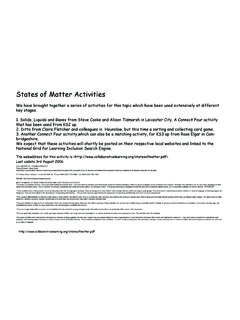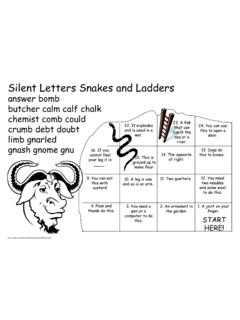Transcription of Punctuation Games - Collaborative learning
1 Punctuation Games These Games were the brainchildren of Rhona Dwyer, English Teacher and Wendy Robinson (confirming our belief that teachers working together are more than twice as creative!) when at The Halifax High School, Calderdale, West Yorkshire. They were designed for a group of year 7 pupils, whom were kept enthralled for over 20 minutes for each game. We have tried them out with younger and older pupils and since they are easily modifiable they work well. To make each game, get an envelope for every 4 pupils. Cut up one of each sheet : Punctuation and Words to go in each envelope. (or better still get the pupils to do it!). The Punctuation squares need to be on coloured card or paper, the words ditto in another colour.
2 If everyone likes the game they can devise their own word cards. Go through the instructions with the class, and give each group of pupils a copy of these instructions. Each group may wish to draw a score sheet on rough paper. The webaddress for this activity is: This activity was first put on the site in 2006 and last updated 3rd October 2012. Collaborative learning PROJECT. Project Director: Stuart Scott We support a network of teaching professionals to develop and disseminate accessible talk-for- learning activities in all subject areas and for all ages. 17, Barford Street, Islington, London N1 0QB UK Phone: 0044 (0)20 7226 8885. Website: BRIEF SUMMARY OF BASIC PRINCIPLES BEHIND OUR TEACHING ACTIVITIES: The project is a teacher network, and a non-profit making educational trust.
3 Our main aim is to develop and disseminate classroom tested examples of effective group strategies that promote talk across all phases and subjects. We hope they will inspire you to develop and use similar strategies in other topics and curriculum areas. We want to encourage you to change them and adapt them to your classroom and students. We run teacher workshops, swapshops and conferences throughout the European Union. The project posts online many activities in all subject areas. An online newsletter is also updated regularly. *These activities are influenced by current thinking about the role of language in learning . They are designed to help children learn through talk and active learning in small groups. They work best in non selective classes where children in need of language or learning support are integrated.
4 They are well suited for the development of oracy. They provide teachers opportunities for assessment of talk. *They support differentiation by placing a high value on what children can offer to each other on a particular topic, and also give children the chance to respect each other's views and formulate shared opinions which they can disseminate to peers. By helping them to take ideas and abstract concepts, discuss, paraphrase and move them about physically, they help to develop thinking skills. *They give children the opportunity to participate in their own words and language in their own time without pressure. Many activities can be tried out in pupils' first languages and afterwards in English. A growing number of activities are available in more than one language, not translated, but mixed, so that you may need more than one language to complete the activity.
5 *They encourage study skills in context, and should therefore be used with a range of appropriate information books which are preferably within reach in the classroom. *They are generally adaptable over a wide age range because children can bring their own knowledge to an activity and refer to books at an appropriate level. The activities work like catalysts. *All project activities were planned and developed by teachers working together, and the main reason they are disseminated is to encourage teachers to work more effectively with each other inside and outside the classroom. They have made it possible for mainstream and language and learning support teachers to share an equal role in curriculum delivery. They should be adapted to local conditions.
6 In order to help us keep pace with curriculum changes, please send any new or revised activities back to the project, so that we can add them to our lists of materials.. Punctuation Games ! Game 1. Open the envelope and take out the Punctuation cards. Pile the cards face down, and take it in turns to turn over the top card. You have to say a sentence which would use the . Punctuation mark you have on your card. ? Where is my coat? . ! If you can do it you get a point. Then the next player turns a card and tries to get a point. Game 2. Divide the Punctuation cards equally between the players, face down. Each player can look at their own cards. One person starts speaking a sentence with one word. Then the person on their left adds another one and so on.
7 The object of the game is to finish the sentence on your go, with the correct Punctuation at the end. And of course try to make sure the others are unable to finish. Then you place the Punctuation card you have used in the middle. ? . To win, you have to get rid of all your cards first. The winner gets 5 points, second gets 4, and so on. Game 3. Divide equally between the players, the Punctuation and the word cards. The aim of the game is to get rid of all your cards, but you can only put down a card if: a. It is the start of the sentence b. It follows on from the last word c. It is the correct Punctuation mark. You get a point for every card you put down. You can only put ? one card down at a time, or pass. Take turns to start each new sentence.
8 ? Add up your scores! Punctuation Games - Punctuation cards Copy on to coloured card. There is 1. set on this sheet - one set goes in one envelope, one envelope for 4 students.. ? ! . ? ! . ? ! . ? ! . ? ! . ? ! . ? Punctuation Games - sentence cards starts with a you're crazy every put a question doesn't look capital letter sentence mark good look at his Little House my favourite you look like hands on the Prairie where are programme is small a did they don't go you going to mouse I've won split my Oh no I've think about trousers close the goldfish door Help at the end of a I wish you go with me, I'm freezing question would I'm scared you're hurting I'm going to I've won a yippee put me fall car what do your tea's the weather what is that you ready smell drop this please cut my I hope you brick finger will Punctuation Games - sentence cards with blanks for pupils to fill want to eat you should large piece your of toast at 11 o'clock eat a today the news I've lost my wow Hey purs









